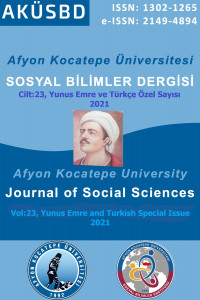Semantic and Syntactic Features of Tense Converbs in Risālat al-Nushiyya
Öz
Anahtar Kelimeler
Yunus Emre Risâletü’n-Nushiyye converbs subclause Old Anatolian Turkish linguistics
Kaynakça
- Boz, E. (2012). Türkiye Türkçesi biçimsel ve anlamsal işlevli biçimbilgisi (Tasnif Denemesi). Ankara: Gazi Kitabevi.
- Çetintaş Yıldırım, F. (2005). Türkçede zaman anlatan ulaçların görünüş özellikleri. Dil ve Edebiyat Dergisi, 2/1(22). 51-62.
- Datlı, D. (2015). Risâletü’n-Nushiyye’nin birleşik fiil örgüsü. Journal of Turkish Studies, 10(8). 795-817. http://dx.doi.org/10.7827/TurkishStudies.8315
- Devellioğlu, F. (2005). Osmanlı Türkçesi sözlüğü. Ankara: Aydın Kitabevi.
- Göksel, A. ve Kerslake, C. (2004). Turkish: A comprehensive grammar. Routledge.
- Gölpınarlı, A. (1965). Yunus Emre Risalat al-Nushiyya ve Divan. İstanbul: Eskişehir Turizm ve Tanıtma Derneği Yayını.
- Gülsevin, G. (1990). Türkçede -sA şart gerundiumu (zarf-fiil) üzerine. Türk Dili, 467, 276-279.
- Gülsevin, G. (2001). Türkiye Türkçesinde birleşik zarf-fiiller. Afyon Kocatepe Üniversitesi Sosyal Bilimler Dergisi, 2(2), 125-143.
- Gülsevin, G. (2011). Eski Anadolu Türkçesinde ekler. Ankara: TDK.
- Gülsevin, G., ve Boz, E. (2004). Eski Anadolu Türkçesi. Ankara: Gazi Kitabevi.
- Günay, U. ve Horata O. (2004) Yunus Emre Risâletü’n-Nushiyye. Ankara: Akçağ Yayınevi.
- Kamacı Gencer, D. (2019). Dede Korkut kitabında bilgi kipliği. Uluslararası Türkçe Edebiyat Kültür Eğitim (TEKE) Dergisi, 1(8), 38-52.
- Kamacı Gencer, D. (2020). Anlamsal bir fenomen olarak kiplik: Dede Korkut örneği. Ankara: Nobel Yayınları.
- Karahan, L. (1994). -sa/-se Eki Hakkında, Türk Dili, 516, 471-474.
- Korkmaz, Z. (2009). Türkiye Türkçesi grameri, şekil bilgisi. Ankara: TDK.
- Lewis, G. L. (2000). Turkish grammar. Oxford: Oxford University Press.
- Mengi, M. (2000). Divan şiiri yazıları (vol. 342). Ankara: Akçağ Yayınları.
- Palmer, F. R. (2001). Mood and modality. Cambridge: Cambridge University Press.
- Salan, E. (2017). {-IcAk} Zarf-fiil eki ve varyantları üzerine. Gazi Türkiyat Türkoloji Araştırmaları Dergisi, 1(21), 45-73.
- Saraç, M., A., Y. (2007). Klasik edebiyat bilgisi belâgat. İstanbul: 3F Yayınevi.
- Tatcı, M. (2008), Yunus Emre divanı (Tenkitli Metin). İstanbul: H Yayınları.
- Tiken, K. (1999). Türkiye Türkçesinde basit ve birleşik zarf-fiillerin ifade ve işlevleri. Türk Dili Araştırmaları Yıllığı-Belleten, 47, 279-364.
- Üstünova, K. (2016). Eylem işletimi. Bursa: Sentez Kitabevi.
- Üzüm, M. (2019). Eski Anadolu Türkçesinde epistemik kiplik: Kısas-ı Enbiya örneği, Ankara: Nobel Yayınevi.
- Yunus Emre (2012). Risâletü’n-Nushiyye öğüt kitabı, (haz. Prof. Dr. Erdoğan Boz) Ankara: Gazi Kitabevi.
Risâletü’n-Nushiyye’de Zaman Ulaçlarının Anlamsal ve Sözdizimsel Özellikleri
Öz
Anahtar Kelimeler
Yunus Emre Risâletü’n-Nushiyye ulaçlar yan tümce Eski Anadolu Türkçesi dilbilim
Kaynakça
- Boz, E. (2012). Türkiye Türkçesi biçimsel ve anlamsal işlevli biçimbilgisi (Tasnif Denemesi). Ankara: Gazi Kitabevi.
- Çetintaş Yıldırım, F. (2005). Türkçede zaman anlatan ulaçların görünüş özellikleri. Dil ve Edebiyat Dergisi, 2/1(22). 51-62.
- Datlı, D. (2015). Risâletü’n-Nushiyye’nin birleşik fiil örgüsü. Journal of Turkish Studies, 10(8). 795-817. http://dx.doi.org/10.7827/TurkishStudies.8315
- Devellioğlu, F. (2005). Osmanlı Türkçesi sözlüğü. Ankara: Aydın Kitabevi.
- Göksel, A. ve Kerslake, C. (2004). Turkish: A comprehensive grammar. Routledge.
- Gölpınarlı, A. (1965). Yunus Emre Risalat al-Nushiyya ve Divan. İstanbul: Eskişehir Turizm ve Tanıtma Derneği Yayını.
- Gülsevin, G. (1990). Türkçede -sA şart gerundiumu (zarf-fiil) üzerine. Türk Dili, 467, 276-279.
- Gülsevin, G. (2001). Türkiye Türkçesinde birleşik zarf-fiiller. Afyon Kocatepe Üniversitesi Sosyal Bilimler Dergisi, 2(2), 125-143.
- Gülsevin, G. (2011). Eski Anadolu Türkçesinde ekler. Ankara: TDK.
- Gülsevin, G., ve Boz, E. (2004). Eski Anadolu Türkçesi. Ankara: Gazi Kitabevi.
- Günay, U. ve Horata O. (2004) Yunus Emre Risâletü’n-Nushiyye. Ankara: Akçağ Yayınevi.
- Kamacı Gencer, D. (2019). Dede Korkut kitabında bilgi kipliği. Uluslararası Türkçe Edebiyat Kültür Eğitim (TEKE) Dergisi, 1(8), 38-52.
- Kamacı Gencer, D. (2020). Anlamsal bir fenomen olarak kiplik: Dede Korkut örneği. Ankara: Nobel Yayınları.
- Karahan, L. (1994). -sa/-se Eki Hakkında, Türk Dili, 516, 471-474.
- Korkmaz, Z. (2009). Türkiye Türkçesi grameri, şekil bilgisi. Ankara: TDK.
- Lewis, G. L. (2000). Turkish grammar. Oxford: Oxford University Press.
- Mengi, M. (2000). Divan şiiri yazıları (vol. 342). Ankara: Akçağ Yayınları.
- Palmer, F. R. (2001). Mood and modality. Cambridge: Cambridge University Press.
- Salan, E. (2017). {-IcAk} Zarf-fiil eki ve varyantları üzerine. Gazi Türkiyat Türkoloji Araştırmaları Dergisi, 1(21), 45-73.
- Saraç, M., A., Y. (2007). Klasik edebiyat bilgisi belâgat. İstanbul: 3F Yayınevi.
- Tatcı, M. (2008), Yunus Emre divanı (Tenkitli Metin). İstanbul: H Yayınları.
- Tiken, K. (1999). Türkiye Türkçesinde basit ve birleşik zarf-fiillerin ifade ve işlevleri. Türk Dili Araştırmaları Yıllığı-Belleten, 47, 279-364.
- Üstünova, K. (2016). Eylem işletimi. Bursa: Sentez Kitabevi.
- Üzüm, M. (2019). Eski Anadolu Türkçesinde epistemik kiplik: Kısas-ı Enbiya örneği, Ankara: Nobel Yayınevi.
- Yunus Emre (2012). Risâletü’n-Nushiyye öğüt kitabı, (haz. Prof. Dr. Erdoğan Boz) Ankara: Gazi Kitabevi.
Ayrıntılar
| Birincil Dil | Türkçe |
|---|---|
| Bölüm | Makaleler |
| Yazarlar | |
| Yayımlanma Tarihi | 30 Kasım 2021 |
| Gönderilme Tarihi | 7 Ekim 2021 |
| Yayımlandığı Sayı | Yıl 2021 Cilt: 23 Sayı: Yunus Emre ve Türkçe Özel Sayısı |

This work is licensed under a Creative Commons Attribution-NonCommercial-NoDerivatives 4.0 International License.

